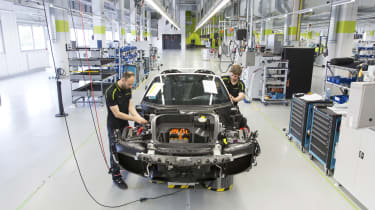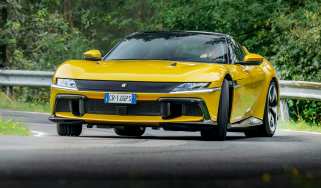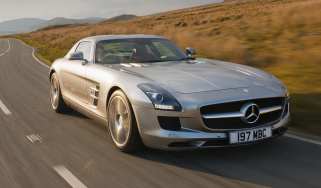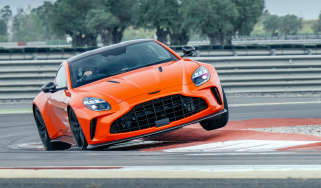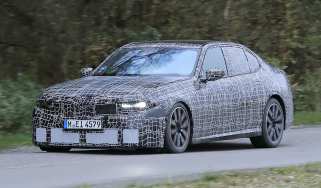Porsche 918 Spyder is no more – last car rolls off production line
Porsche’s hybrid hypercar finishes production after 21 months
It’s been a busy week for Porsche. At the weekend, it overcame its Volkswagen Group rivals Audi to win the Le Mans 24 Hours. Today, the very last 918 Spyder has rolled off the production line at the Stuttgart-Zuffenhausen plant in Germany.
In production for just 21 months, the 918 Spyder was the long-awaited replacement for the spectacular Carrera GT. Unlike its predecessor though, the 918 traded the raw pace of a V10 for a more considered approach to speed, through hybrid technology.
Its 4593cc V8, mounted amidships, is aided by a 95kW electric motor at the front axle and a 115kW electric motor at the rear. Their combined efforts realise a maximum power output of 875bhp and torque of 944lb ft, through a seven-speed PDK.
If not quite a recipe for tedium, some might have suspected the hybrid combination took away some of the Carrera GT’s drama. Not a bit of it – driving the car in evo 200, Jethro Bovingdon described the car’s engine in vivid detail.
‘Wow, the engine. The 4.6-litre V8 is so sharp at the top end but with the electrical boost it feels like a 10 litre in the mid-range. The throttle response is stunning and the instant, precise, scalpel-sharp power is of such quality.
‘The gearbox adds to that ultra-precise feel. It’s so fast and the paddles feel more like microswitches, yet somehow the process feels mechanical… like the McLaren P1, its greatest trick is to make close to 900bhp feel just about right.’
It’s enough that, if you flip to the Knowledge pages of evo Magazine, the 918 just pips the McLaren P1 and LaFerrari for on-road thrills (though the P1 claws back ground on-track).
For Porsche, the 918 is representative of the technologies that will take its more conventional production cars into the future. Hybrid technology is already present in the Panamera and Cayenne lines, but the 918’s hybrid mapping is something that will filter into regular Porsches in future.
As will its ability to convert kinetic energy into electrical energy more efficiently than other hybrids. Some technologies, such as adaptive aerodynamics and rear-axle steering, have already made their way into series production Porsches, such as the 911 Turbo and GT3 models.
It’s sad to see the Porsche 918 Spyder go, though we’ve been lucky enough at evo to have driven it in the car’s prime, and will doubtless do so again. But there’s little doubt that the 918’s eventual successor, and the rest of the Porsche range, will benefit greatly from its existence.


